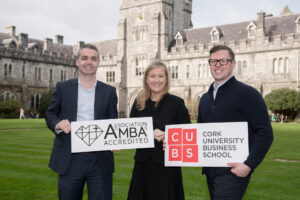New research from AMBA & BGA, in association with Salesforce.org found that 25% of Business School leaders believe microcredentials represent the future of business education, while 6% believe microcredentials are just a passing phase.
The AMBA & BGA Transformation and the emerging business model shift in Business Education report, in association with Saleforce.org, which surveyed 144 Business School decision makers, also found that 50% of Business School leaders institutions already offer microcredentials.
For those that did indicate that their School offers microcredentials, the survey sought to uncover the types on offer. 79% of respondents said their School offers microcredentials for standalone modules; 39% said they are on offer for stackable modules which lead to a degree, and 32% said they are on offer to those attending events or webinars.
Other reasons suggested by respondents for offering microcredentials include certification for belonging to an industry body, or projects organised for students in collaboration with other universities.Participants who said that their School did not currently offer microcredentialing were asked whether they thought their School would invest in them in the next five years. In response, slightly less than half (46%) said their School would be investing in microcredentials, 13% said it does not plan to, and 41% are unsure.
When asked if they see microcredentials provided by companies such as LinkedIn as being a threat to how their Business School will operate in the next five years, just under half of those surveyed (47%) said ‘no’, 35% said ‘yes’, and 18% are unsure.
Andrew Main Wilson, CEO of AMBA & BGA, said, ‘I would like to thank our report sponsor, Salesforce.org, for its generous support and insight in bringing this project together, along with the 144 individuals who took the time and effort to complete the survey.‘It seems that Business Schools are on the precipice of change and while many have dipped their toes in the water of this transformation and model shift, there is an awareness that things will change to an even greater extent.‘One of the most enlightening results from the survey is that 80% of Business School leaders believe their institution is under pressure to change their value proposition and business model.‘However, Business Schools have shown themselves to be resilient and flexible already in the past two years, when faced with the Covid-19 pandemic, and would appear well placed to respond strongly to this perceived pressure to transform their business models.’
Geshri Gunasekera, VP Industry Marketing, Education Cloud, Salesforce.org, said, ‘This research has been conducted during a pivotal moment in time for business schools as the findings demonstrate that while many institutions are embracing this transformation, there is still uncertainty as to whether this model shift will be long term. Empowering business schools to lead through this change and deliver a connected experience for students, staff and alumni is a key goal of our partnership with several leading institutions here at Salesforce.org. We are delighted to partner with AMBA to deliver this valuable research to the industry and those leaders seeking direction while navigating this era of change.’
Key findings
The purpose of the Business School
- 58% of Business School decision-makers believe their primary customer to be students and 33% think the main customer is society itself
- 65% of Business School leaders said teaching and learning is their priority for students at their institution
- 80% believe Business Schools are under pressure to change their value proposition and business model
- 54% believe the role of Business Schools is to develop and nurture responsible managers
User experience of Business Schools
- 58% of leaders believe their Business School’s offering meets student expectations to a great extent
- 29% of Business School Leaders who use a learning management system (LMS) believe the user experience of their online platform should match, to a great extent, those of commercial websites, such as social media platforms or online shopping websites
- 24% of Business School Leaders who use an LMS think that their online platform matches the user experience of these platforms to a great extent
- 29% think that students expect learning management systems to meet the standards of commercial platforms to a great extent and 50% think students only somewhat expect LMS platforms to meet the standards of social media platforms or e-commerce websites
Personalisation
- 72% of Business School leaders believe their institution provides a personalised experience for their students. A quarter (25%) believe this is not the case, and 3% are unsure
- 43% of Business School leaders said that the most personalisation currently on offer to their institution’s students is in the area of teaching and learning, while 21% said, instead, that the most personalisation is in the area of careers support
- 88% agree that personalising the learning experience of their students is something that will grow in importance over the next five years
- 88% think the most important outcome of personalisation is enabling students to achieve the most from their Business School experience
Online and hybrid learning
- 80% of Business School leaders said their institution offers online courses and degrees, while 18% said they do not currently offer any online learning
- 38% strongly agree that offering online courses and degrees will be the norm in the next five years
- 86% of leaders’ Schools are offering a combination of in-person instruction and online instruction (some in-person and some online)
Microcredentials and professional lifelong learning
- 50% of Business School leaders said their School offers microcredentials
- 79% said their School offers microcredentials for standalone modules; 39% offer them for stackable modules which lead to a degree, and 32% offer them for attending events or webinars
- 25% of Business School leaders would go so far as to say microcredentials represent the future of business education, while 6% believe
microcredentials are just a passing phase - 35% see microcredentials provided by companies such as LinkedIn as a threat to how their Business School will operate in the next five years
ENDS
Notes to editors
To read the full report, visit www.assocationofmbas.com/research For more information, interviews or imagery, contact:
Ellen Buchan, Insight and Communications Executive, AMBA & BGA: e.buchan@associationofmbas.com
METHODOLOGY AND PARTICIPANT DEMOGRAPHICS
Between 4 March and 28 March 2022, AMBA & BGA circulated an online questionnaire, polling its networks of Business School decision-makers on trends in education technology and online learning. A total of 144 Business School decision-makers participated in the quantitative survey.
Of those surveyed, 39% represented Business Schools based in Europe (excluding the UK); 15% represented Schools in Latin America; 14% Schools in the UK; 8% Schools in India; 7% Schools in Africa; 7% Schools in Asia and the Middle East (excluding China and India); 6% Schools in China (including Hong Kong, China); 3% Schools in North America and the Caribbean; and 2% Schools based in the Oceania region.
57% classify themselves as deans or directors at Business Schools; 6% work in designing or delivering management programmes at Business Schools; 10% are management academics; 6% work with management students and graduates (for example, careers and alumni staff); 13% work in another role within a Business School; and 9% work in another role within the business and management education industry.
93% of participants’ Schools provide MBA programmes; 74% provide doctorate degrees; 69% provide executive master’s degrees (such as EMBAs); 62% provide customised education programmes; 53% provide open programmes; and 51% provide online programmes. A further 12% said they provide other programmes.
About AMBA & BGA
Spearheading excellence and trailblazing innovation, for more than 50 years the Association of MBAs (AMBA) has been the impartial authority on postgraduate management education. AMBA established that vision in 1967 and, in a volatile, uncertain world, it’s as relevant today as it was then. We are committed to raising the profile and quality standards of business education internationally, for the benefit of Business Schools, students and alumni, employers, communities and society.
- Our accreditation service is the global standard for all MBA, DBA and master’s degrees, currently accrediting programmes from the top 2% of Business Schools in more than 75 countries.
- Our Research and Insight Centre produces a rich body of reports exploring global trends in the business education sector. This drives our global thought leadership and public affairs campaigns.
- We are the only professional membership association that connects MBA students and graduates, accredited Business Schools and MBA employers throughout the world.
- Through our members, AMBA is building an international force for good, championing best practice, responsible management and sustainability. Membership to AMBA means being part of an international community of peers with access to business strategy thought leadership, career advice and knowledge, and an MBA jobs portal.
- Our multi-award-winning events offer networking opportunities online and in person across all continents in association with international corporate partners and thought leaders exclusively for our members and accredited Business Schools.
The Business Graduates Association (BGA) is an international membership and accreditation body of world-leading and high-potential Business Schools that share a commitment for responsible management practices and lifelong learning, and that are looking to provide a positive impact on their students, communities and the economy as a whole. We offer:
- Quality assurance services to Business Schools and similar institutions, aimed at continuous improvement and positive impact to increase a Business School’s credibility and influence.
Consultation and mentorship services to Business Schools to improve their marketing and admissions, programme design, alumni interaction, teaching methods, and career development services. - Award-winning international events for Business School professionals, focused on continuous learning.
- Student and graduate membership, which includes social networking events worldwide, professional development tools, a Career Development Centre, and much more.
- Leading and award-winning content on responsible management, professional and personal growth, and influence via the Business Impact content hub.
About Salesforce.org
Salesforce Education Cloud enables institutions to drive student success at scale and turn siloed systems to actionable insights that personalise the learner experience and transform individual engagements into lifelong relationships.
Education Cloud provides the digital foundation to capture 360-degree views across the entire education journey. Recruitment and admissions, student experience, advancement, and operations teams can use one, integrated platform to capture valuable data that drives learner and institution success.
Business Schools benefit from the latest innovations across the Salesforce platform as well as purpose-built education products and solutions for faculty, staff, and learners that can be customised and scaled to their evolving needs.



